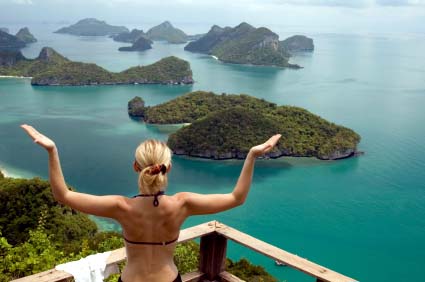 The highly-indebted Seychelles had more visitors than expected in the first eight months of 2009, but revenue for the year is expected to slump by a fifth after aggressive discounting, its tourism chief said.
The highly-indebted Seychelles had more visitors than expected in the first eight months of 2009, but revenue for the year is expected to slump by a fifth after aggressive discounting, its tourism chief said.
The Indian Ocean archipelago’s white beaches and topaz waters are a favourite playground for tycoons, royals and celebrities, but the global downturn has squeezed demand for long-haul vacations.
“We had forecast a drop of 10 percent in visitor arrivals and a corresponding drop of 20-25 percent in tourism receipts. Now that we have closed August, the performance to date is negative 5 percent in arrivals,” Maurice Lostau-Lalanne, chief executive officer of the Seychelles Tourism Board, told Reuters.
Tourism is the archipelago’s key economic driver and source of foreign exchange. Receipts in 2008 amounted to $321 million, roughly one third of the island’s gross domestic product.
Lostau-Lalanne said May and June had been the best on record since the Seychelles launched its tourism sector in 1972.
However, hotels have been forced to offer generous discounts to holiday-makers from key European markets to compete with rival destinations such as Indian Ocean neighbour Mauritius and the Caribbean.
“We stand by a drop of 20 percent in revenue (on 2008) given the fall in arrivals and the fact that hotels have had to incentivise heavily with prices,” he said.
He said the fall took into account the sharp devaluation of the local currency after a raft of economic reforms to liberalise the once state controlled economy last November.
Last month, the International Monetary Fund upgraded its outlook for Seychelles’ economy in 2009 to a contraction of 8-9 percent from an earlier forecast of an 11 percent shrinkage on healthier-than-expected tourism figures.
Earlier this year, the tourism board launched an aggressive marketing campaign to woo middle-market clients whose spending habits are more susceptible to change in tough economic times.
“The smaller hotels are now enjoying about 80 percent occupancy compared to 60 percent last year,” he said.
The archipelago, which is home to scores of rare birds, reptiles and plants, is looking to the east of its core European markets in the search for new business.
In 2008, Russia outperformed forecasts with 7,000 visitors, up 20 percent on the year previous. The number of holidaymakers from the Middle East soared 50 percent last year — with many of them arriving on private jets.
There are plans to double its tourism capacity — currently 3,000 hotel beds across 11 islands — over the next five years.














